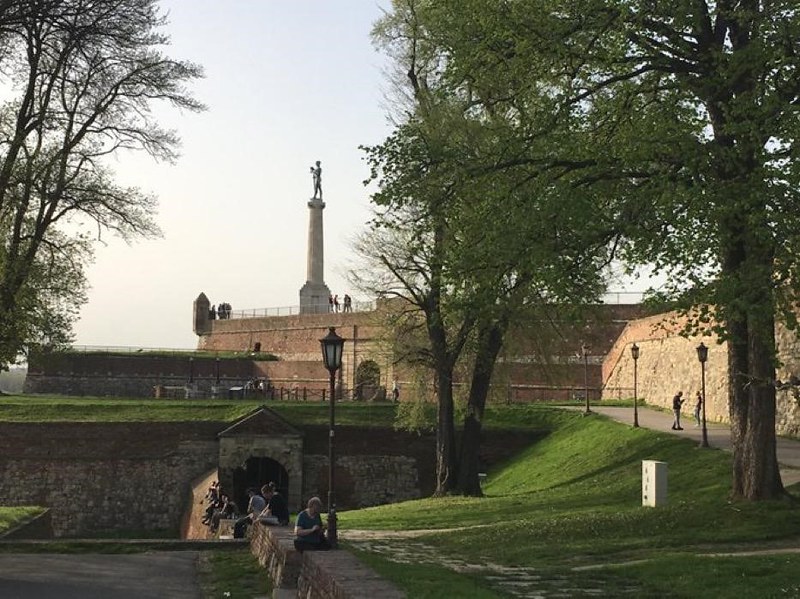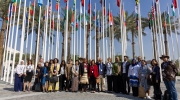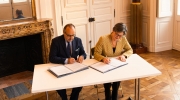European experts release highly critical report about controversial cable-car project on the Belgrade Fortress, Serbia
Europa Nostra, the leading heritage organisation in Europe issued today a Report strongly opposing a controversial project that plans to build a cable-car at the site of the Belgrade Fortress, one of the most important historical monuments of the Republic of Serbia and a highly significant testimony of European history. The legally questionable and ill-conceived project would have devastating consequences on the authenticity and integrity of this iconic site, it is noted in the Report. For this reason, Europa Nostra Serbia has also nominated the Belgrade Fortress for the next “7 Most Endangered list” which will be announced in spring 2020 by Europa Nostra in Partnership with the European Investment Bank Institute.
The Report was prepared on the basis of a high-level inter-disciplinary mission to Belgrade, undertaken by Europa Nostra experts on 4-10 May 2019. During the mission, the Europa Nostra Delegation visited the Belgrade Fortress and held meetings with professional bodies, NGOs, Public Institutions, Ministries concerned – including the Ministry of Culture and Information, the Ministry of Trade, Tourism and Telecommunication, and the Ministry of Construction, Infrastructure and Transport- and with the Prime Minister of the Republic of Serbia Ms. Ana Brnabić, with the aim of mobilising efforts to save the endangered site. The Report was endorsed by the Europa Nostra Board and Council at their meetings on 18-19 June 2019 and presented both to the Cabinet of the Serbian Prime Minister and to the Serbian Minister of Culture and Information Mr. Vladan Vukosavljević on 17 July 2019.
The cable-car project, initiated by the Belgrade City authorities in 2018, envisages to connect the Belgrade Fortress site known as Kalemegdan with the Ušće Park located in the opposite bank of the Sava River. The invasive cable-car would compromise irreversibly the historic and aesthetic values of the Belgrade Fortress (including the Kalemegdan Park and Ancient Roman site of Singidunum), a protected site of exceptional importance for the Republic of Serbia and included in Serbia’s Tentative List of properties for nomination to the UNESCO World Heritage List since 2015, highlights the report.
‘The Belgrade Fortress is an outstanding example of a multi-layered fortified complex and a unique testimony of the numerous empires that have shaped Belgrade, Serbia and Europe. Documenting material remains from the Roman, Byzantine, Hungarian, Bulgarian, Serbian, Ottoman and Habsburg Periods, it bears witness to Europe’s historic frontiers for over eighteen centuries. Europa Nostra believes that the high value of this protected cultural monument calls for maximal care and respect and invites Serbian authorities to act accordingly.’ said Prof. Dr. Hermann Parzinger, Executive President of Europa Nostra.
In addition to a detailed description of the site, the controversial cable-car project and the large public and expert campaign against this project, the Report outlines ten main observations made by Europa Nostra experts and puts forward seven recommendations to safeguard and enhance the Belgrade Fortress (see below).
The full report can be consulted here.
10 Key Observations by Europa Nostra experts:
- The Belgrade Fortress is an irreplaceable heritage site of national, European and World Heritage significance, and should be preserved applying highest standards.
- The cable-car construction would cause irreversible damage to the authenticity and integrity of the site.
- The rationale of the cable-car project is unclear, while cost-benefit analyses and feasibility studies are lacking.
- A serious Heritage Impact Assessment is lacking, breaching national and international standards of best practice.
- The transnational nomination of the site to the UNESCO World Heritage List within the Frontiers of Roman Empire is under threat, jeopardizing an opportunity for long-term preservation and sustainable tourism development.
- The cable-car project is incompatible with national legislation as well as with international and European heritage conventions signed and ratified by Serbia.
- There is clear evidence of undue pressures on heritage institutions and of bypassing professional bodies during the decision-making process.
- There is a lack of transparency, public dialogue and consultationwith relevant stakeholders, which has led to a deplorable restriction of the public debate.
- The project has faced a widespread criticism from experts, civil society and the media, including a petition signed by over 15 000 citizens who request the abortion of the project.
- This is not an isolated case of unsatisfactory heritage protection, with many heritage sites in Serbia being endangered by the increasingly permissive urban planning and construction system.
7 recommendations to safeguard and enhance the Belgrade Fortress
- Reconsider all questionable documents, measures and permits issued in the process of the cable-car planning to make sure that the site is not compromised by illegal or inadequate decisions.
- Prepare a thorough Heritage Impact Assessment of the cable-car project by an independent team of competent experts.
- Invest efforts and expertise for a successful nomination of the Belgrade Fortress to the UNESCO World Heritage while making sure that its current condition is improved instead of endangered.
- Ensure systemic heritage research, restoration, maintenance and presentation of the site to enhance its knowledge and attractiveness.
- Find suitable, less costly and non-invasive alternatives to the cable-car, for example a pedestrian/cycling bridge or a system of eco-boats.
- Provide for transparency and due involvement of experts and citizens through a participatory decision-making process.
- Treat heritage as the country’s key asset for sustainable development and make sure that heritage which is a public good belonging to all citizens is not compromised for short-term investments and profits of a few.
For more information:
Visnja Kisic
Secretary General, Europa Nostra Serbia
Tel. +381 (0) 63 686 647
visnja@europanostraserbia.org
Sneska-Quaedvlieg-Mihailovic
Secretary General, Europa Nostra
Tel. +32 (0) 2 400 77 02
lao@europanostra.org
Background information
Europa Nostra
Europa Nostra is the leading pan-European federation of heritage NGOs active for more than 50 years in over 40 countries. Supported by a wide network of public bodies, private companies and individuals, Europa Nostra is recognised as the most representative heritage network in Europe and THE voice of civil society committed to safeguarding and promoting Europe’s cultural heritage. Europa Nostra contributes to the development of heritage-related policies and strategies in Europe, celebrates excellence and promote best practices through the European Heritage Awards / Europa Nostra Awards and campaigns to save Europe’s most endangered monuments, sites and landscapes, above all through the 7 Most Endangered programme.
The Belgrade Fortress
The Belgrade Fortress is located at the confluence of the Sava River with the Danube River at the north-west end of the historic city of Belgrade, in the municipality of Stari Grad. It consists of the old citadel (Upper and Lower Town) and the Kalemegdan Park (Large and Little Kalemegdan). The Belgrade Fortress was declared a Monument of Culture of Exceptional Importance in 1979, and is protected by the Republic of Serbia. The cliff-like ridge overlooks the Great War Island and is considered the most beautiful natural lookouts in Belgrade. It is the most visited tourist site in Belgrade and it is loved and enjoyed by generations of inhabitants of Belgrade and Serbia.









